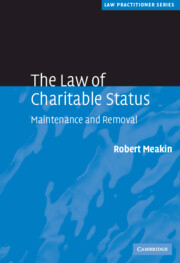Book contents
- Frontmatter
- Contents
- Table of Cases
- Table of Statutes
- 1 Introduction
- 2 Essential indicia of charitable status
- 3 The powers of the Commission to remove charities from the register
- 4 Limits on the Commission's powers to remove controversial charities from the register
- 5 Property
- 6 The Commission's powers of investigation and the use of those powers to remove charities from the register
- 7 How the Commission's powers to remove charities from the register may be affected by changes to the law of charitable status
- 8 Grounds for appeal
- 9 Conclusion
- Bibliography
- Index
5 - Property
Published online by Cambridge University Press: 23 July 2009
- Frontmatter
- Contents
- Table of Cases
- Table of Statutes
- 1 Introduction
- 2 Essential indicia of charitable status
- 3 The powers of the Commission to remove charities from the register
- 4 Limits on the Commission's powers to remove controversial charities from the register
- 5 Property
- 6 The Commission's powers of investigation and the use of those powers to remove charities from the register
- 7 How the Commission's powers to remove charities from the register may be affected by changes to the law of charitable status
- 8 Grounds for appeal
- 9 Conclusion
- Bibliography
- Index
Summary
Introduction
It is one of the basic propositions of this book that a distinction needs to be made between the governing instrument of a charity and property held for charitable purposes. While a charity might be removed from the register it does not necessarily mean that its property will be lost to charity. It is argued in this chapter that it will rarely be the case that property will be lost to charity when the charity is removed from the register, where its property is applied cy-pres for charitable purposes. Removal of the governing instrument of the charity where its property continues to be applied for charitable purposes means that the effect of removal will not be drastic. This is a further illustration of the overall thesis that the Commission's powers of removal are limited.
The Dormant Accounts Project being carried out by the Commission, which involves the use of its powers to make use of charitable property where it is left fallow, indicates that the Commission is as much interested in removing inactive charities from the register as it is in maximising the use of charitable property.
Before exploring how the effect of removal might be minimal there is a need to examine the relevant objective of the Commission.
The position of the Commission
The Commission has, inter alia, a charitable resources objective, which is defined as meaning the promotion of the effective use of charitable resources.
- Type
- Chapter
- Information
- The Law of Charitable StatusMaintenance and Removal, pp. 103 - 113Publisher: Cambridge University PressPrint publication year: 2008



